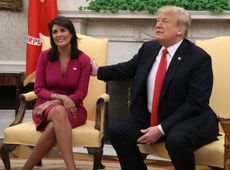Coronavirus and the case for one-world government
Why the international Rule of None must be replaced by the Rule of One


My headline should be enough to give away the game. I am conscious of the fact that in arguing for one-world government in the face of a global health crisis I am going to be accused of two things. The first will be that I am cheapening the suffering of those affected by what the Chinese first called "Wuhan pneumonia" (a name I prefer to the abbreviation common in English-language media for reasons I will discuss below). The second will be that I am carrying water for Mssrs. Bezos, Gates, Brin, and Buffet, for the UN and the IMF and the WHO and all the other dreaded acronyms. To the first I respond guilty as charged, at least if one assumes (not implausibly) that at present engaging in any activity save for prayer or relief efforts is inherently cheapening. It is the second objection to my thesis that I think should be met head on.
By advocating one-world government, am I in fact serving as a toady for billionaires and the organizations that exist to recycle their PowerPoints as humanitarian and cosmopolitan? I say no because I believe that such a system of government is the only real solution to them and their rule, which I will call, in the interest of saving space, the Rule of None. What is the Rule of None? It is not anarchy per se. There is still, under such conditions, a visible state. But the interests of the state (any state) are ultimately subordinate to that of capital itself, which knows no boundaries, respects no customs or arrangements, yields nothing before traditions or bonds or idiosyncrasies. Rule by None means that the only supranational authority is the principle of arithmetical increase for its own sake, which has no master. Men and women control capital, but it would be truer to say that capital controls men and women, perhaps especially the world's wealthiest. Hence the Rule of None.
Who flourishes under this Rule? A short answer would be no one. But this is not entirely true. The wealthy become wealthier, as a matter of course, in every country, while the middle class and the poor become immiserated in ways both expected and unexpected. This does not exhaust the list of asymmetries that result from it. In practice countries that profess allegiance to the Rule of None but refuse to abide by it — mouthing along with free trade and economic decentralization as slogans while relentlessly working to enrich their own citizens — enjoy an advantage over those who remain faithful both in word and deed. This is, simply put, the economic history of the United States and, to a lesser extent, Western Europe since the end of the Cold War.
Subscribe to The Week
Escape your echo chamber. Get the facts behind the news, plus analysis from multiple perspectives.

Sign up for The Week's Free Newsletters
From our morning news briefing to a weekly Good News Newsletter, get the best of The Week delivered directly to your inbox.
From our morning news briefing to a weekly Good News Newsletter, get the best of The Week delivered directly to your inbox.
The sophists, economists, and calculators who say that freedom of trade and movement are, theoretically speaking, life-enhancing policies are correct. They are also naive. They have forgotten one of the fundamental lessons of their discipline — the so-called prisoners' dilemma. This is why they are wrong and nationalist thinkers are right when they argue that antagonisms between nations will never disappear and that we must replace the global sovereignty of capital with some other, more tangible authority. They only err in locating this new authority in the nation rather than in something higher.
This is why I propose replacing the Rule of None with the Rule of One. The One I have in mind is a sovereignty that would be truly global, in the sense that it would be capable, by the principle of subsidiarity, of delegating an infinite number of decisions to the rulers of countries and regions and counties and cities and towns while still reserving for itself the power to decree and, more to the point, to coordinate activity between leaders at all of the aforementioned levels. The Rule of One would look nothing like the United Nations, which betrayed the hopes of Otto von Habsburg and Cardinal Ottaviani by becoming a bloated international charity whose chief beneficiaries are its own officers. Nor would it very much resemble the European Union, which has failed precisely because it is economic rather than political, which is to say, because it decrees that all men must use the same money rather than that all men must obey the same ruler. The Rule of One is not an argument for the elimination of national or local customs. It is, in fact, probably the strongest argument in favor of them that one could make. The Rule of One would be, as Plutarch wrote of Alexander the Great's Camp, "a festival goblet, mixing lives, manners, customs, wedlock, all together," a world in which it is "ordained that every one should take the whole habitable world for his country."
There was once a name for the Rule of One: Empire. While many of us would shy away from the idea for aesthetic reasons, I believe there is even an argument to be made that if we were ever to return to the Rule One we should call the person in whom authority is vested "emperor" rather than "president" or, heaven help us, "secretary-general." I think it is equally obvious that he or she would be elected, as were the Holy Roman Emperors of old, rather than the mere inheritors of office.
Back to Wuhan pneumonia. So far from being a racist pejorative I say that it is a better name than "COVID-19," a cold abbreviation that obscures the enormous human experience of the disease. Human beings need tangible words for tangible things and events, which is why in the past new illnesses were named after the places in which they appear to have originated (e.g., near the Ebola, the headstream of the Mongala, which is itself a mere tributary of the great Congo River). The event through which we are now living began some months ago in a place called Wuhan. The authorities in that place did their best to conceal the seriousness of the disease from their own citizens and from the rest of the world. They persuaded others whose authority comes to them from the Rule of None — the World Health Organization, the American opinion-making classes — that the virus could not even be transmitted from person to person.
Sign up for Today's Best Articles in your inbox
A free daily email with the biggest news stories of the day – and the best features from TheWeek.com
These were lies. They were lies that have had consequences not only for the people of Wuhan and of China but for the rest of the world. They were lies that were made possibly only because of a greater and much older lie: that because these people live here in such a place rather than in the place we inhabit ourselves we owe them nothing and will do nothing to aid them, indeed we will quietly abet their misery so long as we are marginally better off. This is the lie that says that men who live far away from us are not our brothers but strangers who must be turned away, isolated behind lines agreed upon by those on either side.
The problem is not the name but the lines. The lines must disappear. They will have to disappear even as the names and tongues and customs remain. Wuhan pneumonia reminds us that, despite the wickedness and perfidy of their leaders and ours, the people of Wuhan (and those of Italy and Spain and France and the Congo) are men and women like us, who share our longings and aspirations and worries and fears because all of these things are universal.
It is not for me to say when the Rule of None will be displaced. I suspect that even when we are confronted with its obvious shortcomings, as we are whenever a new pandemic emerges, we will refuse to acknowledge them. For the time being those of us who see past the "international wrong" must cling to hope and to symbols. Which symbols? For me the best candidate for a new international peace is not Donald Trump or even Angela Merkel (the wisest of our living politicians) but King Arthur, who, in T.H. White's wonderful novel cycle, dreams before his death of the Rule of One:
He began to think again, but now it was as clearly as it had ever been. He remembered the aged necromancer who had educated him—who had educated him with animals. There were, he remembered, something like half a million different species of animal, of which mankind was only one. Of course man was an animal—he was not a vegetable or a mineral, was he? And Merlyn had taught him about animals so that the single species might learn by looking at the problems of the thousands. He remembered the belligerent ants, who claimed their boundaries, and the pacific geese, who did not. He remembered his lesson from the badger. He remembered Lyo-lyok and the island which they had seen on their migration, where all those puffins, razorbills, guillemots and kittiwakes had lived together peacefully, preserving their own kinds of civilization without war—because they claimed no boundaries. He saw the problem before him as plain as a map. The fantastic thing about war was that it was fought about nothing—literally nothing. Frontiers were imaginary lines. There was no visible line between Scotland and England, although Flodden and Bannockburn had been fought about it. It was geography which was the cause—political geography. It was nothing else. Nations did not need to have the same kind of civilization, nor the same kind of leader, any more than the puffins and the guillemots did. They could keep their own civilizations, like Esquimaux and Hottentots, if they would give each other freedom of trade and free passage and access to the world. Countries would have to become counties—but counties which could keep their own culture and local laws. The imaginary lines on the earth's surface only needed to be unimagined. The airborne birds skipped them by nature. How mad the frontiers had seemed to Lyo-lyok, and would to Man if he could learn to fly.The old King felt refreshed, clear-headed, almost ready to begin again.There would be a day—there must be a day—when he would come back to Gramarye with a new Round Table which had no corners, just as the world had none—a table without boundaries between the nations who would sit to feast there.
Want more essential commentary and analysis like this delivered straight to your inbox? Sign up for The Week's "Today's best articles" newsletter here.
Create an account with the same email registered to your subscription to unlock access.
Matthew Walther is a national correspondent at The Week. His work has also appeared in First Things, The Spectator of London, The Catholic Herald, National Review, and other publications. He is currently writing a biography of the Rev. Montague Summers. He is also a Robert Novak Journalism Fellow.
-
Why is Tesla stumbling?
In the Spotlight More competition, confusion about the future and a giant pay package for Elon Musk
By Joel Mathis, The Week US Published
-
 How Taylor Swift changed copyright negotiations in music
How Taylor Swift changed copyright negotiations in musicunder the radar The success of Taylor's Version rerecordings has put new pressure on record labels
By Theara Coleman, The Week US Published
-
 Job scams are increasingly common. Here's what to look out for.
Job scams are increasingly common. Here's what to look out for.The Explainer You should never pay for an application or give out your personal info before being hired
By Becca Stanek, The Week US Published
-
 Arizona court reinstates 1864 abortion ban
Arizona court reinstates 1864 abortion banSpeed Read The law makes all abortions illegal in the state except to save the mother's life
By Rafi Schwartz, The Week US Published
-
 Less than total recall
Less than total recallEditor's Letter Why our brains want to forget the darkest days of the pandemic
By Theunis Bates Published
-
 Trump, billions richer, is selling Bibles
Trump, billions richer, is selling BiblesSpeed Read The former president is hawking a $60 "God Bless the USA Bible"
By Peter Weber, The Week US Published
-
 'A wonky bureaucratic tweak has dramatically changed how Americans drive'
'A wonky bureaucratic tweak has dramatically changed how Americans drive'Instant Opinion Opinion, comment and editorials of the day
By Harold Maass, The Week US Published
-
 The debate about Biden's age and mental fitness
The debate about Biden's age and mental fitnessIn Depth Some critics argue Biden is too old to run again. Does the argument have merit?
By Grayson Quay Published
-
 How would a second Trump presidency affect Britain?
How would a second Trump presidency affect Britain?Today's Big Question Re-election of Republican frontrunner could threaten UK security, warns former head of secret service
By Harriet Marsden, The Week UK Published
-
 'Rwanda plan is less a deterrent and more a bluff'
'Rwanda plan is less a deterrent and more a bluff'Instant Opinion Opinion, comment and editorials of the day
By The Week UK Published
-
 'If Mr. Trump is such a strong candidate, why is he afraid of Ms. Haley?'
'If Mr. Trump is such a strong candidate, why is he afraid of Ms. Haley?'Instant Opinion Opinion, comment and editorials of the day
By Harold Maass, The Week US Published